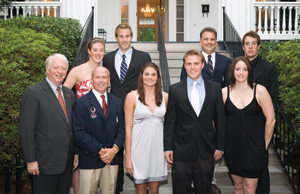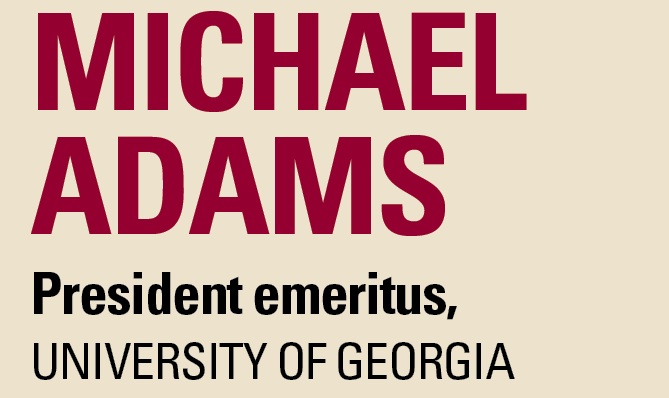 |
All photos this page: UNIVERSITY OF GEORGIA
|
It’s been nearly 10 years since University of Georgia President Michael Adams forced out athletic director and local legend Vince Dooley. Georgia fans with long memories — which are most of them — haven’t forgotten. Upon the news that Adams would step down after 16 years as president, a headline on fan site DawgSports.com blared: “Bulldog Nation Planning Parties to Celebrate the Blessed Event.”
Whatever criticisms Adams endured at Georgia, they mostly stayed in his own backyard. On the national stage, Adams was viewed as a thought leader among university presidents, especially when it came to athletics. He was chairman of the NCAA’s executive committee, sat on the Division I board of directors and voiced support for a college football playoff when it clearly wasn’t a cool thing to do. While it wasn’t widely known, Adams also developed a close friendship with former NCAA President Myles Brand and visited him often in the
final months of Brand’s battle against pancreatic cancer. Even though Adams, 65, has stepped down as Georgia’s president, he still has strong views on the role of university presidents in athletics and other issues facing the NCAA. He spoke recently with SportsBusiness Journal’s Michael Smith.
■ During my 16 years at Georgia, the popularity of college athletics has expanded dramatically. That’s evidenced in overall attendance, the media deals, the improvement in TV. The impact all of that has on conferences is much greater than it was when I first got to Georgia. And most of it has been for the better, [but] not all of it. But at Georgia, we’re better off than we were 16 years ago. We’ve won a lot of championships, there’s money in the bank and not a lot of debt.
■ It’s a different market situation for Mark Richt than it is for me. People will just have to decide if one or both of us are overpaid. I’ve been paid fairly in my market and Mark is paid fairly in his market. I do worry about growing disparities in assistant coach salaries. That kind of thing is hard to explain to a physics professor. Those divisions [between coaches and faculty members] have gotten to be greater and greater, and it’s a legitimate concern for the future.
 |
Adams with Georgia’s 2008 Olympic swimmers and divers
|
■ I don’t know if college athletics has become that much more commercialized, but the impact is great because of the money and visibility. I read “The Big Scrum,” and people were cheating and playing for pay in the late 19th century in much greater fashion than today.
■ If you look at the last 50 years, college football is probably cleaner today than at any point since that time. But the amount of money coaches make, and that all of us spend on athletics, that’s what everyone pays attention to. For Georgia to have an athletics budget of $100 million would have been unthinkable just a few years ago.
■ What we’re taking out of fans’ pockets with concessions, tickets, parking, it’s pushed about as far as we can push. I don’t think you’ll see as many increases in the next 15 years as the last 15 years.
■ When I got to Georgia [in 1997], I expected to be involved in athletics because I love it. I have a real admiration for the players and coaches. It does still bring a lot of positives to the university community.
■ As far as its core functions — managing championships, certifying athletes, rules — the NCAA has done very well. It doesn’t get the credit it deserves for that.
■ We’ve had more high-profile cases in the last 18 months than I’ve ever seen, with Miami, Ohio State, Penn State. So in addition to the mistakes that have been made, there’s also been a lot of bad luck with the timing of the issues that have arisen. I’m not ready to throw out the NCAA.
■ The member schools are the NCAA, so we make the rules. Sometimes they can certainly be administered better. We’re all concerned with enforcement, and some of it you can’t defend. During the time I was chairman [of the NCAA’s executive committee], we almost doubled the budget for enforcement. We added a lot more people, so a lot more is being discovered now. So you have to bear the consequences of hanging your dirty linen out there for all to see. It cuts both ways. I’ve thought for a long time that we have to do a better job with punishment and crime.
■ I don’t think I ought to comment on [NCAA President Mark Emmert]. I rotated off the board and that’s another group making those decisions now. It’s up to them. Somebody else is board chair now. But the media certainly needs to be asking those questions.
 |
Adams with football coach Mark Richt
|
■ I’m one that thinks the president has to be in control of lots of things, not just athletics. At Georgia, we have a fairly sophisticated system of stem cell research, so you have to know the core issues. You know what you need to know and then let the others manage. It’s not unlike athletics. We have a great AD [Greg McGarity], and he knows what I want to know and what I don’t need to know. The university community in Georgia needs to think you’re in control because you bear the ultimate responsibility, but day to day, you don’t do that.
 |
Adams, with mascot Uga, says athletics brings many positives to the university.
|
■ ADs are right about the NCAA. They should have more of a voice. They’re the experts. ADs and commissioners need a seat at the table on most NCAA issues. I’d agree that they have not been consulted adequately the last few years.
■ Every organization, like the NCAA, has to be reborn and revitalized, periodically. They have to adjust to the times and circumstances. The bigger an organization becomes, the harder that is. Clearly, there are some things the NCAA’s better at than others. There are a lot of good people there. I know many of them. If we didn’t have it, it’d be awfully hard to re-create it. I’d rather see reform from within than throw out the whole enterprise.
■ It’s easy to overstate the potential impact of the O’Bannon case. It has come to represent things far greater than what the O’Bannon case was intended to represent. Until the courts rule on that, I don’t think we know the impact. I agree that there’s a legitimate question about use of likeness in a video game. I’m open to listening to arguments on that.
■ With all due respect to Ed O’Bannon and Herschel Walker and Michael Jordan, they’re extreme rarities. They are not the norm. Ninety-six percent of the kids in the SEC will never cash a check of any kind, anywhere, based on what sport they play. You can read too much into the O’Bannon case if you’re not careful.
■ I’m a believer in the amateur model, real student athletes. I’d be for some tweaking of the cost of attendance. There should be some stipend of $2,000 or $3,000 on top of books. I’m open to that. For that short list of kids who become famous, you might pay them a royalty check after they graduate. I would not do that while they’re students. That’s where the whole house of cards comes down.









